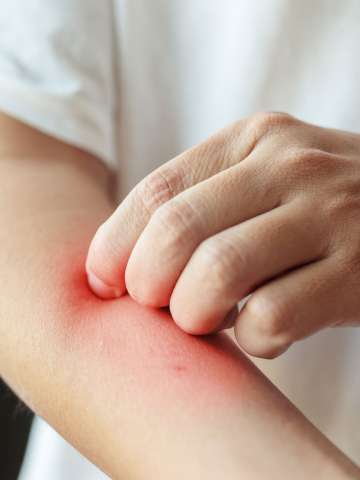Myositis Care

Why choose UCLA Health for myositis treatment?
Our UCLA Health myositis team provides the highest level of individualized, targeted care for patients with myositis. This rare but serious condition can cause inflammation and damage to multiple organs, including the muscles, skin, lungs and heart. We offer comprehensive evaluations for patients with suspected myositis and full-spectrum care for those with a confirmed diagnosis.
Our specialists are part of the UCLA Health rheumatology team, which is consistently ranked among the top rheumatology programs in the nation by U.S. News & World Report.
Highlights of our program include:
Team-based care: Our multispecialty team includes expert rheumatologists, neurologists specializing in neuromuscular care, pulmonologists, dermatologists, cardiologists and pathologists. This team approach allows us to create personalized, effective treatment plans for your unique needs and symptoms.
Specialized experts: You receive care from rheumatologists and other experts who specialize in myositis. These providers have years of experience diagnosing and treating this rare disease and are well-versed in its possible complications.
Research emphasis: UCLA Health physicians are active researchers as well as clinicians. We participate in research studies to understand this rare disease better and clinical trials to bring you the latest treatments, often before they’re widely available.
What is myositis?
The word myositis is a term for muscle inflammation. Clinically, myositis refers to a group of diseases that can cause long-lasting (chronic) inflammation of your muscles. However, some forms of myositis cause no muscle weakness, primarily affecting your skin and lungs. Myositis can be serious and may require immediate, aggressive care to reduce symptoms and prevent permanent damage.
People with myositis often experience progressive muscle weakness or swelling. These symptoms usually affect the shoulders, hips or thighs, although they may also affect other parts of the body, such as the muscles responsible for breathing or swallowing.
Myositis is often an autoimmune disease, which causes your body to mistakenly view healthy tissue as foreign and attack it. Our specialists test for specific antibodies to confirm and classify the type of autoimmune myositis. We also run tests to rule out other causes of muscle inflammation, such as metabolic or genetic abnormalities or drug toxicities.
Types of myositis
Our specialists evaluate, diagnose and treat the many different types of myositis, including:
Dermatomyositis: This type tends to cause a skin rash and affect several different muscle groups. Women and children are more likely to have dermatomyositis although it may also affect men.
Polymyositis: This disease can affect both women and men, but it primarily affects women ages 30 to 60. It affects multiple muscle groups, especially the thighs, hips or shoulders.
Amyopathic dermatomyositis: This rare type of myositis occurs when people appear to have dermatomyositis with no muscle weakness. Some people may also have interstitial lung disease, which can cause inflammation and scarring in the lungs. Early treatment can help prevent permanent lung damage.
Anti-synthetase syndrome: This type of myositis typically affects several parts of the body, including the muscles, skin and lungs. People with this type have myositis along with interstitial lung disease. They may also have Raynaud’s phenomenon, in which the fingers or toes change color or go numb when exposed to cold temperatures. Some people may have severe inflammatory arthritis and recurrent fevers as well.
Immune-mediated necrotizing myositis: This type of myositis causes severe muscle weakness that makes it difficult to use the arms or legs. Muscle tissue dies very quickly in a process called necrosis.
Inclusion body myositis: This type is more likely to affect men over age 50. It causes progressive muscle weakness in the legs or arms, making it difficult to balance well or grip objects. The disease may also affect the swallowing muscles.
Overlap myositis: People with overlap myositis have myositis along with other autoimmune diseases, such as lupus, scleroderma, rheumatoid arthritis or Sjögren’s syndrome.
Myositis treatments we offer
Early recognition of myositis symptoms is key to controlling the disease and lowering the risk of complications. We provide comprehensive, personalized evaluation and treatment for myositis that may include:
Medications: Our providers may initially prescribe medicines that keep the immune system from attacking healthy tissues (immunosuppressive and immunomodulatory medications). It’s important to slow the immune attack to reduce inflammation as quickly as possible and prevent organ damage. Our goal is to significantly decrease symptoms with high doses of medication and then lower the dosage to control the disease over time. With early, aggressive therapy, many patients with autoimmune myositis can lead typical lives.
Exercise: Aerobic activity can help increase lung function and muscle strength. A physical or respiratory therapist can help you establish an exercise routine that safely improves your stamina. You can discuss a gradual approach to exercise with your rheumatologist.
Clinical trial treatments: UCLA Health patients may have access to new drug treatments or other therapies through clinical trials. Ask your provider about your options for clinical trial treatments for myositis.
Rheumatology
Neurology
Dermatology
Cardiology
Pathology
Contact us
Call 310-825-2631 to request an appointment with a myositis specialist at UCLA Health.
Find your care
We offer full-spectrum evaluation and treatment for people with suspected or diagnosed myositis. Call 310-825-2631 to find out more about myositis treatment at UCLA Health.









